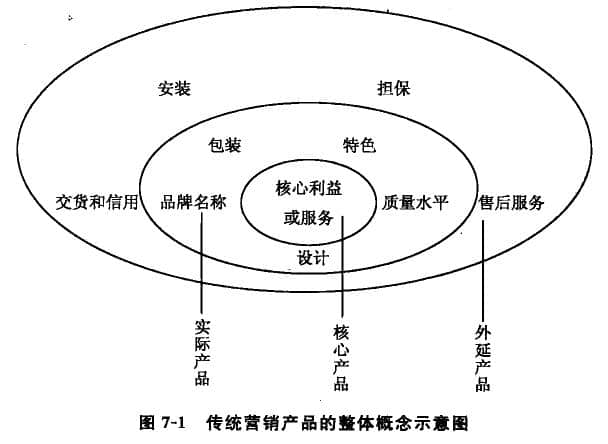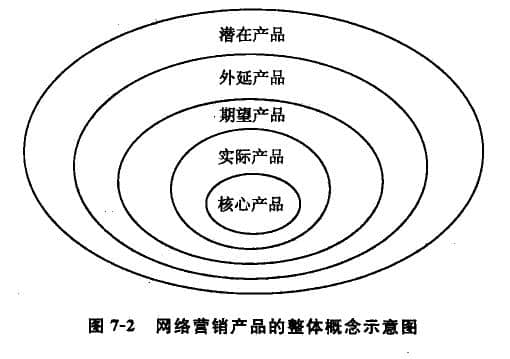Designing products and services that meet the needs of online consumers is the core task of the enterprise's online marketing product strategy. Because the site of online marketing activities is a virtual online world, which is very different from the traditional marketing in the real world, the process of selling goods online is somewhat different from the traditional sales process. Network marketing has certain requirements for the products to be marketed. So, what kind of products are suitable for network marketing? It is necessary to carefully study the attributes of commodities Beijing website construction The choice of appropriate marketing strategies for commodities is also an important factor in the success of enterprise network marketing.
(1) The overall improvement of the product under the traditional distribution mode
A product is anything that can be provided to the market so as to attract people's attention, be used or consumed by people, and meet a certain desire or need. Products are not just tangible goods. Broadly speaking, products include tangible goods, services, organizations, ideas, or combinations of these entities. Philip Kotler proposed that product developers should study products and services from three levels: core products, actual products and extension products, which constitutes the overall concept of products under the traditional marketing mode, as shown in Figure 7-1.

(2) Overall concept of network industrial and marketing products
The difference between online marketing and traditional marketing mainly comes from the virtuality of the Internet. In the network virtual market, the interaction between enterprises and customers has been greatly enhanced. At the same time, the diversified and personalized needs of customers have been better met. In order to reflect the particularity of customers in product marketing operation under the network marketing environment, the overall concept of product is further expanded, that is, on the premise of the existing three levels in the traditional product concept, two levels of expected product and potential product are expanded, as shown in Figure 7-2.
1. Core products
The core product is the basic level of the product. Its meaning is the same as that of the core product in the overall concept of the traditional product. It refers to the basic utility or benefits that the product can provide to customers, is the substantive thing that customers really want to buy, and solves the problem of "what the buyer really wants to buy". For example, customers buy bread to satisfy their hunger. This level of interests is the undifferentiated interests pursued by consumers in the target market. Here, enterprises should pay attention to reflect the outstanding characteristics of online marketing, that is, interactivity, and fully understand customers' needs through the network to better serve customers. For enterprises engaged in network marketing, when developing and designing network products, they should focus on customers and make the basic utility provided by their products meet the needs of customers. For example, consumers buy anti-virus software to protect computer security, not to occupy less memory, beautiful operation interface, etc. At the same time, because different types of customers have different core needs for the same product, enterprises should also pay attention to identification in the process of marketing to customers. Sometimes the same product can have different core needs, for example, consumers' needs for clothing, shoes and hats, some of which focus on warmth, while others focus on beauty, emphasizing the function of decoration and beautification.
2. Actual products
The meaning of the actual product is the same as that of the actual product in the overall concept of the traditional product. It is the material carrier of the core product, and the basic utility of the product is reflected and reflected through the material form of the actual product. The actual product has five characteristics, including quality level, characteristics, design, brand name and packaging.
3. Expected products
Expected product is a unique level in the overall concept of online marketing products, which refers to the customer's expectations on product quality, characteristics and ease of use before purchase. It can guide enterprises to develop and design core products and actual products. In online marketing, the dominant position of customers has been raised to a higher level. The demand of customers is developing towards diversification and individuation, and online marketing enhances the interaction between enterprises and customers, providing a platform for communication. If enterprises want to gain competitive advantage through online marketing, they must use the Internet to provide consumers with personalized products more carefully. For example, in order to meet customers' expectations of buying computers, Dell allows customers to design and assemble their own computers (including hardware configuration, software configuration and price, etc.) through the Internet, and then send them to Dell's production department in the form of orders for production, and the distribution company sends the computers to customers, In addition, the location of the computer can be queried in real time on the network. In order to meet this demand, for tangible products, enterprises must implement flexible production and management in design, production and supply; For intangible products (such as services, software, etc.), enterprises are required to provide services according to customers' needs.
4. Extension products
The extended product has the same meaning as the extended product in the overall concept of traditional products. It refers to the additional services or benefits that customers get from the producers or operators of products when they purchase products, including the provision of credit, quality assurance, free delivery and after-sales services. In online marketing, since most competitors can provide additional services such as delivery and installation, online marketing should break through the traditional restrictions to strengthen and extend the development of extension products, such as increasing after-sales services, providing free training and value-added services For example, use KV30. Jiangmin Company, famous for anti-virus software, is to attract a large number of customers by providing users with free upgrade, online anti-virus and technical support services online. In terms of the diversity of the network and the competitiveness of the modern economy, this will be a necessary way for enterprises to compete for online customers.
5. Potential products
Potential product is a unique level of the overall concept of online marketing products. It is a product level beyond the extended product level, which is provided by enterprises to meet the potential needs of customers. It is mainly a value-added service of products. The main difference between the extension product and the extension product is that customers can still use the core benefits and services of the product well without potential product level. In the era of increasingly rapid development of high-tech, there are many potential needs and interests that have not been recognized by customers, which requires enterprises to better meet customers' potential needs through guidance and support.




